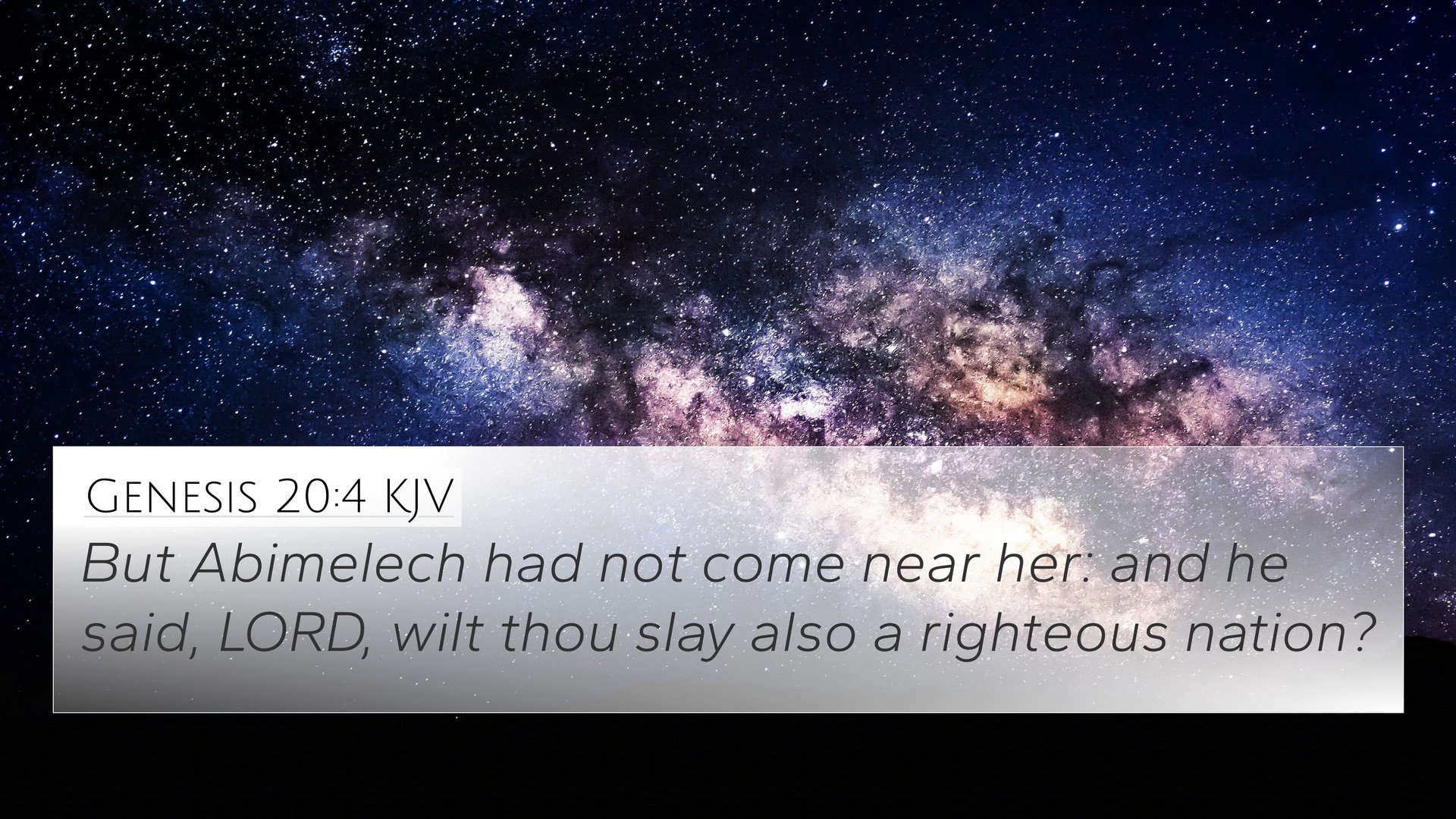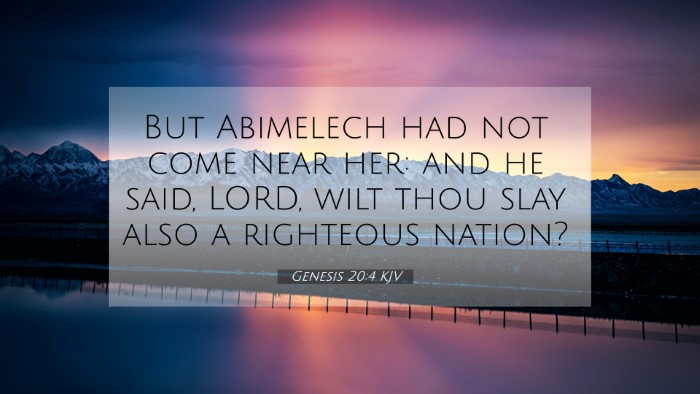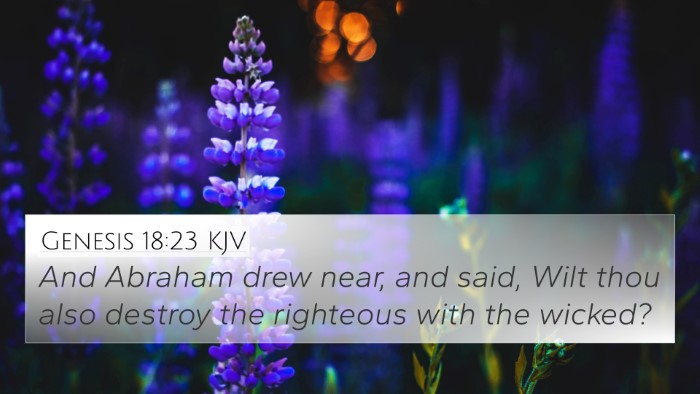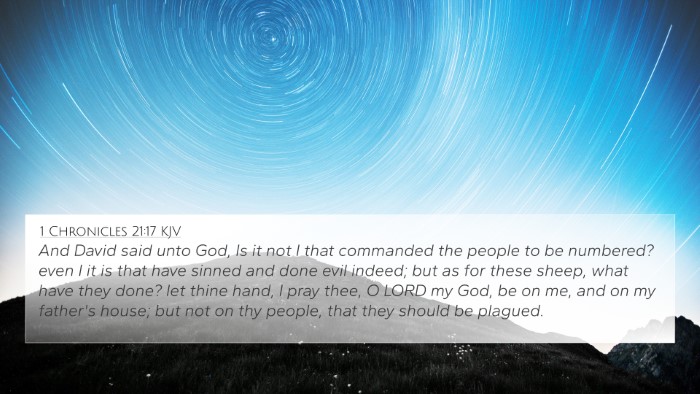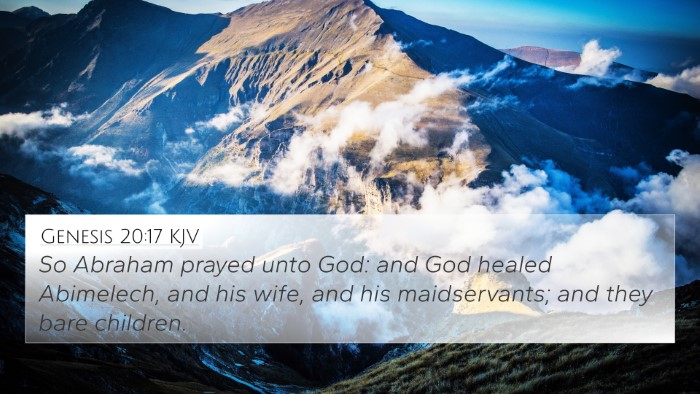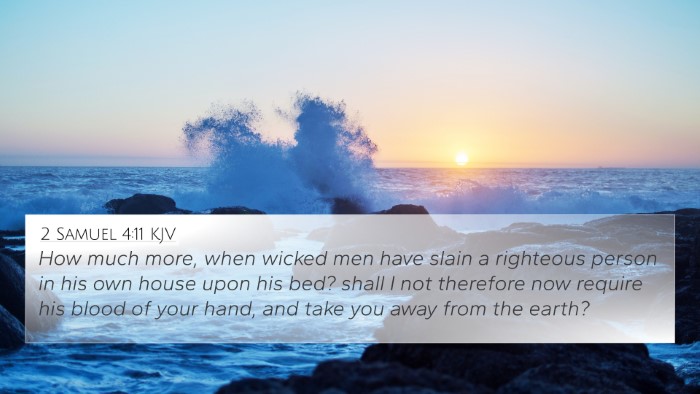Meaning of Genesis 20:4
Bible Verse: Genesis 20:4 - "But Abimelech had not come near her; and he said, Lord, wilt thou slay also a righteous nation?"
Contextual Overview
In Genesis 20, we find the story of Abraham and Abimelech. Abraham, fearing for his life because of his beautiful wife Sarah, lies about their relationship, claiming she is his sister. This verse captures Abimelech's dialogue with God after unknowingly taking Sarah as his wife.
Commentaries Summary
This section combines insights from notable commentators:
-
Matthew Henry:
Henry emphasizes Abimelech's integrity, noting that he had not touched Sarah and questioned God's justice in punishing an innocent people for the sin of one man. It highlights the moral dilemmas and themes of divine justice.
-
Albert Barnes:
Barnes discusses the righteousness of Abimelech, stating that his act was done in ignorance. He reflects on the contrast between righteous nations and individuals who may suffer due to deceit, pointing out God's mercy in revealing the truth to Abimelech.
-
Adam Clarke:
Clarke elaborates on the cultural background, suggesting that Abimelech's appeal to God demonstrates a notable understanding of righteousness. He implies that Abimelech's question reveals a deeper concern for justice, showcasing his character amidst the lies of Abraham.
Thematic Connections
Genesis 20:4 opens discussions on various themes in the Bible, including:
- Deceit and its Consequences: The narrative illustrates the ramifications of deceitful behavior as experienced by Abraham.
- Divine Justice: Abimelech's inquiry into righteousness poses questions about God's treatment of nations versus individuals.
- Divine Intervention: God's protection over Sarah and the revelation to Abimelech denotes divine stewardship in human affairs.
Cross-References
This verse can be understood more deeply by cross-referencing with other biblical texts:
- Genesis 12:10-20 - The earlier account of Abraham's similar deception in Egypt.
- Genesis 26:6-11 - Isaac repeats Abraham's deception concerning Rebecca, illustrating a family pattern.
- Proverbs 14:34 - "Righteousness exalts a nation, but sin is a reproach to any people."
- Exodus 23:7 - Emphasizes the importance of not striking down the innocent and righteous.
- Romans 2:14-16 - Discusses Gentiles who do not have the law but do by nature what the law requires, tying into Abimelech's righteousness.
- Matthew 5:45 - "For he maketh his sun to rise on the evil and on the good," echoing God's impartiality toward nations.
- Genesis 18:23-25 - Abraham argues with God concerning the fate of the righteous, connecting with Abimelech's query.
Conclusion
Genesis 20:4 raises significant questions about morality, the nature of righteousness, and divine fairness. The insights from the commentaries, alongside the thematic connections and cross-references provided, illuminate the intricacies of faith and the moral fabric entwined within the Biblical narrative.
Tools for Cross-Referencing
For deeper studies, consider utilizing tools for Bible cross-referencing such as:
- Bible concordances
- Bible cross-reference guides
- Cross-reference Bible study materials
Further Study Suggestions
For those studying Genesis 20:4, further exploration could involve:
- Examining the narrative’s impact on understanding Old Testament ethics.
- Comparative studies between this text and New Testament interpretations of righteousness.
- Looking at how cross-references enhance comprehension of socio-cultural dynamics in biblical times.
Additional Insights
Understanding Genesis 20:4 is enhanced through inter-Biblical dialogues, allowing readers to see the multifaceted approach toward righteousness and justice presented across scriptures.
